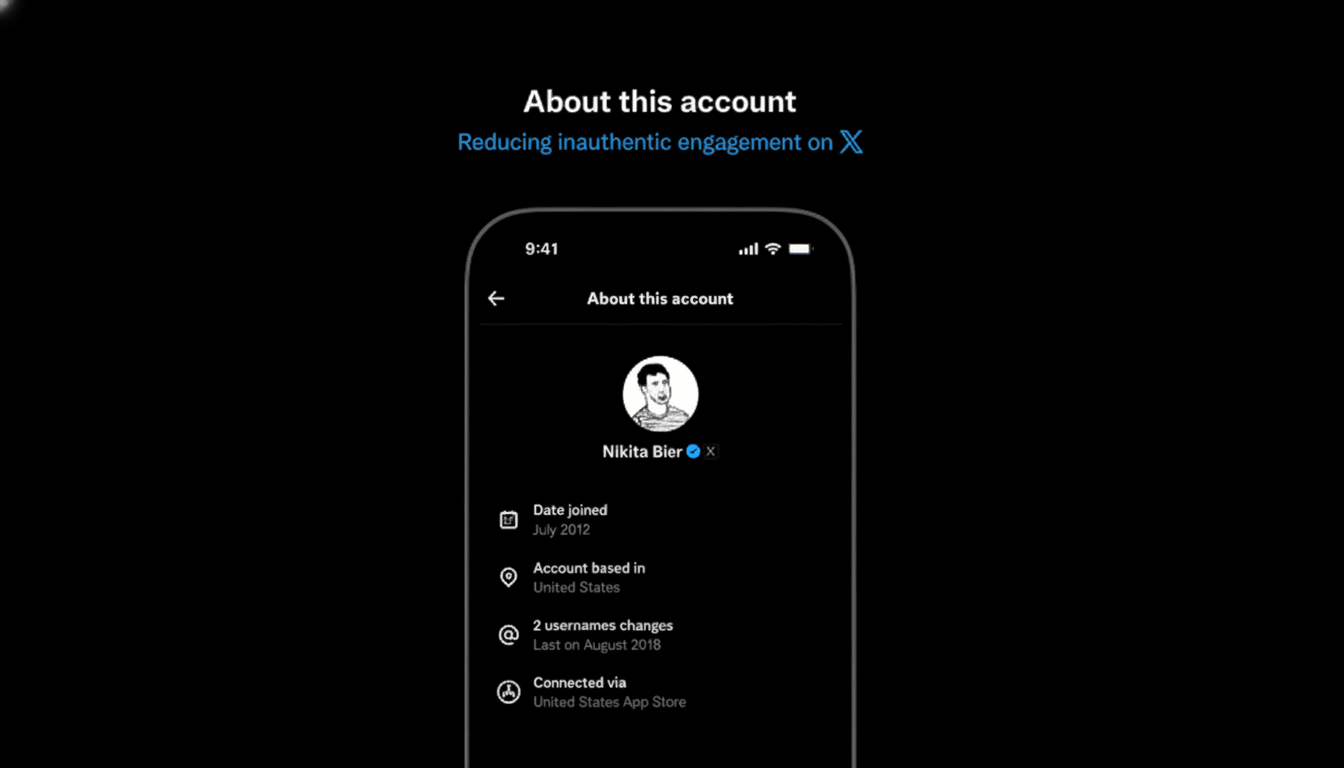For a few hours recently, X quietly introduced on accounts a profile flag indicating from where the user was posting — only to pull it back after users uncovered inaccuracies. The experimental badge appeared inside a new “About this account” panel that was accessible by tapping an account’s join date and displayed the current country, determined using network IP addresses, not the declared location field. Then it vanished without explanation.
What appeared in profiles and why the test took off quickly
The rollout appeared to be an effort to add provenance signals to profiles at a moment when authenticity metrics can influence public conversation. The panel at times displayed the country where the account had been first registered in addition to the current posting country. Hours later, the country lines disappeared, implying a sudden reversal while engineers rejiggered it.

X engineering manager “Bier” admitted to misclassifications in responses to users. One example showed that a Canadian account was incorrectly identified as coming from the U.S.; another indicated that one sign-up location from Korea had been misattributed. Bier credited errors to Starlink routing in one instance, and to employing a VPN in another, saying the team was adding indicators where a VPN had potentially skewed results. The remarks suggested X plans to bring back the feature following adjustments to its accuracy and disclosure language.
The episode is illustrative of the tension between speed and reliability in live social products. X didn’t issue a formal announcement or policy statement alongside the test, generating uncertainty about how it decides that a country is detected and what response, if any, should be adopted.
Accuracy challenges when VPNs and Starlink shape IP routing
Country-of-origin labels are normally based on IP geolocation databases and indications from internet service providers. Commercial databases under normal conditions purport to have very high country-level accuracy, often exceeding 99%. But there are complications in the modern world.
As with other satellite services, such as Starlink, traffic from users is often dynamically steered between gateways, and carrier-grade NAT can cause many of them to appear behind shared addresses. Mobile networks, however, redeploy IPs quickly too. In the case of VPNs and privacy tools, location is obfuscated intentionally by routing data through exit nodes in other countries. Research from companies including GWI and DataReportal has found that about 25% to 30% of internet users say they use VPN or proxy tools, with higher rates in some regions. When those behaviors are prevalent, a platform-wide country label can be directionally useful but still inaccurate for a sizable portion of accounts at any point in time.
Displaying context — such as a “may be influenced by VPN” badge, a timestamp of when the country was last resolved, or whether it is the current posting location versus the historical sign-up country — can reduce misinterpretation. Without that, users may place too much weight on the tag or, worse, use it to dismiss legitimate voices whose traffic just so happens to pass through some other country.

Why Country Stamps of Approval Matter for Trust
But even with the hiccups, the experiment was met positively by many users. Provenance cues may help readers consider the geopolitical context of heated conversations, especially about elections, conflicts, and health information. After years of manipulation of platforms by foreign influence operations cataloged by academic researchers and government investigators, simple signals — where an account seems to be posting from now, and where it registered originally — can become valuable inputs.
Other services have experimented with such ideas. Meta displays the country of top administrators on Facebook Pages with large followings to offer insight into potential cross-border messaging. It does not go as far as disclosing individual profiles behind the likes, providing a snapshot of the balance between transparency and personal privacy.
And privacy advocates warn that letting people know even at the country level where a user is can have a chilling effect on speech by dissidents, journalists, and marginalized communities. Groups like the Electronic Frontier Foundation have long cautioned that location signals can be abused, especially in repressive environments, as a form of harassment or targeting. For travelers, refugees, or diaspora communities, a dynamic country tag is highly likely to upend — and confuse — audiences and carry risk. If X does bring the label back, it’s clear that a consent model, user education, and strong safety guardrails will be important.
What to watch next as X retools country labels and disclosure
All indications are that a re-release will come with improved caveats and detection. Look for explanations about how X knows what country you’re based in, how often it updates this information, and what happens when the service runs up against satellites, mobile carriers, corporate networks, or VPNs — along with whether advertisers, researchers, or enforcement teams could access the same data that users get to see. Transparent documentation and an appeals process would have helped reduce edge cases and build confidence after the sudden pullback.
Yet for X, which has often heavily relied on community-driven context and comparatively lighter-touch moderation, provenance signals like a country tag are a handy way to add authenticity cues without much in the way of heavy editorial lifting. But as the overnight rollout-and-reversal demonstrates, the execution — technically, ethically, and communicatively — matters on this idea just as much as the idea itself.

